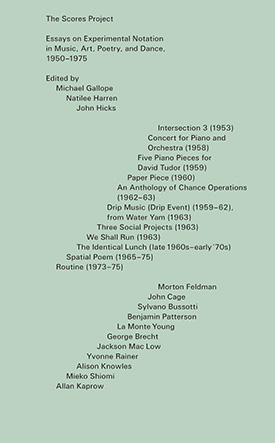
The Scores Project: Essays on Experimental Notation in Music, Art, Poetry, and Dance, 1950–1975
Edited by Michael Galllope, Natilee Harren, and John Hicks
2025
256 pages
PDF file size: 3.7 MB
Description
Individuals working in and across the fields of visual art, music, poetry, theater, and dance in the mid–twentieth century began to use experimental scores in ways that revolutionized artistic practice and opened up new forms of interdisciplinary collaboration. Their experimental methods—associated with the neo-avant-garde, neo-Dadaism, intermedia, Fluxus, and postmodernism—exploded in notoriety during the 1960s in locales from New York to Europe, East Asia, and Latin America, becoming foundational to global trends in contemporary art and performance.
The Scores Project provides an in-depth view of this historical moment. Through expert commentaries from an interdisciplinary team of scholars with accompanying illustrations, this publication examines a series of experimental scores by John Cage, George Brecht, Sylvano Bussotti, Morton Feldman, Allan Kaprow, Alison Knowles, Jackson Mac Low, Benjamin Patterson, Yvonne Rainer, Mieko Shiomi, David Tudor, and La Monte Young. Ambitious, provocative, and playful, The Scores Project is an illuminating resource to scholars and students who seek to understand this innovative and historically complex moment in the history of art.
An expanded edition of this open-access publication is available for free online at www.getty.edu/publications/scores/. It includes more than 2,800 images, audio/video files, and interactive features. Also available are free PDF and EPUB downloads of the book.
Table of Contents
- Introduction, Michael Gallope, Natilee Harren, and John Hicks
- 1. Morton Feldman: Intersection 3 (1953), Michael Gallope
- 2. John Cage: Concert for Piano and Orchestra (1958), Michael Gallope and Nancy Perloff
- 3. Sylvano Bussotti: Five Piano Pieces for David Tudor (1959), Michael Gallope
- 4. Benjamin Patterson: Paper Piece (1960), George E. Lewis
- 5. La Monte Young, ed.: An Anthology of Chance Operations (1962–63, Benjamin Piekut
- 6. George Brecht: Drip Music (Drip Event) (1959–62), from Water Yam (1963), Natilee Harren
- 7. Jackson Mac Low: Three Social Projects (1963), John Hicks
- 8. Yvonne Rainer: We Shall Run (1963), Julia Bryan-Wilson
- 9. Alison Knowles: The Identical Lunch (late 1960s–early ’70s), Emily Ruth Capper
- 10. Mieko Shiomi: Spatial Poem (1965–75), Natilee Harren
- 11. Allan Kaprow: Routine (1973–75), Emily Ruth Capper
- Object Index
- Contributors
- Acknowledgments
About the Authors
Michael Gallope is professor of cultural studies and comparative literature at the University of Minnesota. His most recent book is The Musician as Philosopher: New York’s Vernacular Avant-Garde, 1958–1978 (University of Chicago Press, 2024).
Natilee Harren is associate professor of modern and contemporary art history and theory at the University of Houston School of Art and the author of Fluxus Forms: Scores, Multiples, and the Eternal Network (University of Chicago Press, 2020).
John Hicks is a lecturer in the Department of Cultural Studies and Comparative Literature at the University of Minnesota.
Julia Bryan-Wilson is professor of art history and gender studies at Columbia University. Her most recent book is Louise Nevelson’s Sculpture: Drag, Color, Join, Face (Yale University Press, 2023).
Emily Ruth Capper is assistant professor in the Department of Art History at the University of Minnesota. Her first book, Happening Pedagogy: Allan Kaprow’s Experiments in Instruction, 1948–1968, is forthcoming from the University of Chicago Press.
George E. Lewis is the Edwin H. Case Professor of American Music at Columbia University. He is the author of A Power Stronger Than Itself: The AACM and American Experimental Music (University of Chicago Press, 2008).
Nancy Perloff is curator of modern and contemporary collections at the Getty Research Institute. She is the author of Concrete Poetry: A 21st-Century Anthology (Reaktion, 2023).
Benjamin Piekut is professor and chair of the Department of Music at Cornell University.